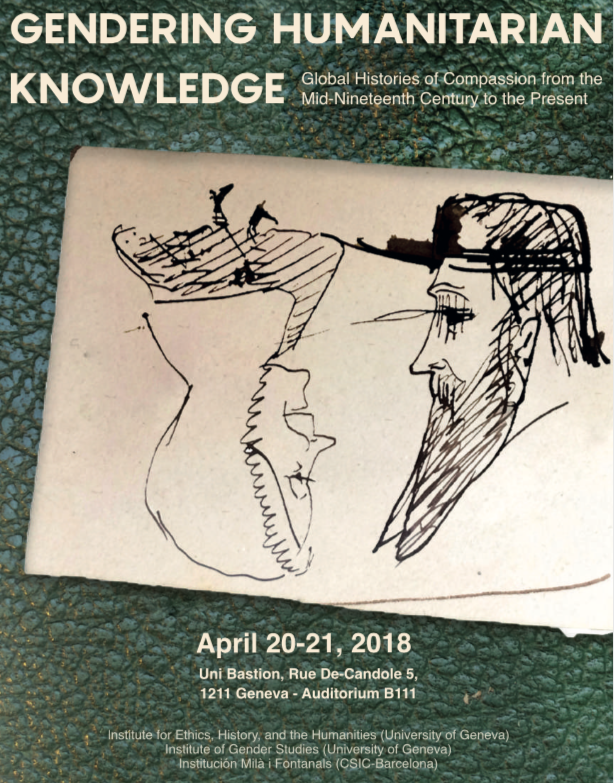
Friday, 20 April 2018
9:00 Welcome and introduction
What history of humanitarian relief?
Gian Marco Vidor (iEH2, University of Geneva)
The faces of compassion in Sarah Monod’s drawings during the Franco-Prussian War (1870-1871)
Dolores Martín Moruno (iEH2, University of Geneva)
9:30 Keynote 1
Introduction
Dolores Martín Moruno (University of Geneva)
Feminism and humanitarianism in contention? Some episodes from British women’s history, c.1880-1940
Anne Summers (Birkbeck College, University of London)
10:45 Panel 1. Women Humanitarians: Heroines, Angels or Whores?
Chair: Davide Rodogno (Graduate Institute, Geneva)
Female humanitarian work during the Carlist War (1872-1876): Concepción Arenal and the Ladies’ Section of Spanish Red Cross
Jon Arrizabalaga (IMF-CSIC, Barcelona)
Angels or harridans? Dr Hilda Clark and Edith Pye, female physcians in the First World War
Linda Palfreeman (Universidad San Pablo-CEU, Valencia)
Between holy and whore. Female nursing during WWI
Leo van Bergen (Netherlands Institute for Military History/Dutch Veterans Institute)
12:15 Keynote 2
Introduction
Gian Marco Vidor (University of Geneva)
The emotional labour of doing relief work and writing about it: Emily Hobhouse’s ‘martyr complex’, 1899-1926
Rebecca Gill (Hudderseld University)
14:30 Panel 2. Female Compassion as Humanitarian Action
Chair: Bertrand Taithe (University of Manchester)
Temperance unions for mothers of every nation. Sword of compassion, shield of sisterhood and smashed saloons
Audrey Bonvin (University of Fribourg)
An examination of Belgian nurses and godmothers: their emotional battle in the Great War
Marie Leyder (iEH2/Institute of Gender Studies, University of Geneva)
Motherly humanitarians and Gold Coast Mothers: the Red Cross and maternal and infant welfare, c.1930-1950
Holly Ashford (University of Cambridge)
16:30 Panel 3. Intersectionality Meets Humanitarians Knowledge
Chair: Irène Hermann (University of Geneva)
British women’s Armenian relief work (1894-1897): An attempt at a multi-layered gendered approach of humanitarian knowledge
Stéphanie Prévost (Paris-Diderot University)
Health, gender and the Jewish nation in humanitarian practice after the Great War
Jaclyn Granick (University of Oxford)
Female nurses, male doctors: Gendering humanitarian relief in Southern Republican Spain during the Civil War (1936-1939)
Xavier García Ferrandis (Universidad Católica de Valencia)
Saturday, 21 April 2018
8:45 Keynote 3
Introduction
Jon Arrizabalaga (IMF-CSIC, Barcelona)
Gendering the business practices of aristocratic humanitarians, the Stafford House Committee 1875-1885
Bertrand Taithe (University of Manchester)
9:30 Panel 4: Glocal Re ections on Humanitarian Knowledge
Chair: Valérie Gorin (CERAH/University of Geneva)
Taking care of strangers: feelings of compassivity in Catholic voluntarism among the Daughters of Charity in Spain and Cuba,1840-1900
Carlos Zuñiga Nieto (Max Planck Institute for the Human Development)
A woman’s grace: Emily Keene and British imperialism in Morocco
Francisco Javier Martínez Antonio (Universidade de Evora, Portugal)
Humanitarian careers of Swiss women medical graduates in the rst half of the 20th century Africa and India Natalia Tikhonov Sigrist (Vllaams Akademisch Centrum, Belgium)
11:30 Panel 5. Gendering Exiles: Experience as Humanitarian Knowledge
Chair: Luís Manuel Calvo Salgado (University of Zurich)
Gendering the Spanish exile in Post-War France: the sur- geon María Gómez in the Hospital Varsovia of Toulouse
Àlvar Martínez-Vidal (Universitat de València)
Traumatic pain: air raids, separation anxiety and the in uence of Anna Freud’s Hampstead War Nurseries
Leticia Fernández Fontecha (Columbia University, USA)
Ukrainian women in relief work in refugee camps during WWII
Oleksandra Kunovska Mondoux (University of Fribourg/World Federation of Ukrainian
Women’s Organizations)
11:30 Final discussion